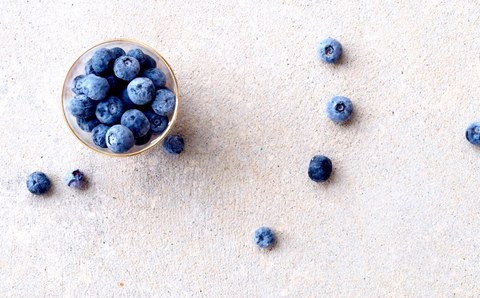My uncle always used to tell me “you are what you eat, Jason.”
For the longest time, I thought I might literally turn into a shrimp because I was always pillaging the shrimp cocktail during Easter brunch.
Not the worst creature to turn into, I guess. Though one could argue I also made a strong case for French fries, Stouffer’s mac and cheese, pop-tarts, and Coca-Cola.
At the time, I didn’t realize the hidden truth behind my uncle’s message — that your body and your health are only as good as the food you put into it.
As someone who spent much of his upper teens and younger 20’s suffering from anxiety, I could’ve really benefited from understanding the importance of diet. Today, I’m 29 years old going on 30, and I can thankfully say that I haven’t experienced debilitating anxiety in over 6 years.
Diet Is the Reason Why
You see, even though the human body is incredibly versatile and able to convert just about anything edible into energy, your physical and mental health suffer greatly after one too many trips to Taco Bell (no matter how good it might taste).
This seems like an easy fix – stop eating garbage food.

However, in practice eating healthier is much harder because garbage food happens to taste delicious, and, let’s be honest, who doesn’t love delicious tasting food? It’s actually kind of addicting thanks to the way our hormones work.
But alas, when it comes to your health, breaking out of poor dieting habits is key to feeling better again, and it all boils down to two main reasons:
1. Nutrient Deficiency
In case you didn’t know, planet Earth is in the middle of a global pandemic. Millions, dare I say billions, of people suffer from some variety of nutritional deficiency. Nutritional deficiencies can lead to a number of physical ailments, but what’s interesting to you is that they also impact your mental health.
Let’s look at Vitamin D. Studies show that somewhere around 1 billion people are deficient in this little guy WHO COMES FROM THE SUN! While lack of Vitamin D may not be the cause of your anxiety, it’s strongly linked to depression, and the lack of it isn’t doing your mood any favors.

Vitamin D aside, the human body requires a lot of other vitamins and minerals – commonly referred to as micronutrients – that are essential to things like growth, development, bodily function, and fighting illness. Micronutrients aren’t produced naturally in the body, which means you need to get them from the foods you eat (or from the sun, too, in Vitamin D’s case).
That means you should ditch the Taco Bell - which has next to zero micronutrients - and instead opt for more nutrient dense foods such as fresh vegetables, fruit, whole grains, and fatty fish.
The good news with nutrient deficiency is that, in many cases, symptoms lessen in severity rather quickly once the deficiency is corrected. Depending on your specific case, they might even go away completely.
Vitamin D aside, the human body requires a lot of other vitamins and minerals – commonly referred to as micronutrients – that are essential to things like growth, development, bodily function, and fighting illness. Micronutrients aren’t produced naturally in the body, which means you need to get them from the foods you eat (or from the sun, too, in Vitamin D’s case).
That means you should ditch the Taco Bell - which has next to zero micronutrients - and instead opt for more nutrient dense foods such as fresh vegetables, fruit, whole grains, and fatty fish.
The good news with nutrient deficiency is that, in many cases, symptoms lessen in severity rather quickly once the deficiency is corrected. Depending on your specific case, they might even go away completely.
2. Inflammation
Now let’s switch gears from nutrient deficiency and focus on one little word that may very well change your life: inflammation.
With all the anxiety research going on, inflammation has been popping up over and over again, which means it might just be the root of all evil.
In the words of Dr. Vincent Pedre, "Inflammation causes oxidative stress (a form of biochemical stress), which leads to distress signals in the brain that can lead to either depression or anxiety—or both. On the flip side, we know that the brain will release cytokines (the same chemical messengers your immune system uses to communicate an alert) in response to mental stress. The cytokines regulate really important brain functions, including neurotransmitter metabolism as well as the connection and communication between nerve cells."
What all that fancy jargon boils down to is this - inflammation creates distress in your brain and thus throughout your body.
The struggle here is that inflammation is extremely taxing on your body and the immune system. You only have so many resources to allocate to various parts of the body. If too much inflammation occurs, you essentially run out of available resources to manage it, and you wear yourself down in trying to.
So the goal then is to reduce inflammation. And since this section on inflammation is located within an article about diet, can you guess what one of the biggest sources of inflammation in your life is?
You nailed it. Diet.
Chances are high that your diet is causing an enormous amount of inflammation throughout your body. In order to stop inflammation from rampaging your mental health and taking years off your life, you ideally want to follow an anti-inflammatory diet.
This means:
- Stop eating high-inflammatory foods such as fast food, fried food, pasta with crappy noodles (aka most American-grown crops), and pre-packaged foods (pop-tarts, Stouffer’s mac and cheese, potato chips, Cheetos, etc.)
- Start eating anti-inflammatory foods such as berries, bone broth, spinach, arugula, grass-fed meats, and healthy fats (extra virgin olive oil, flax oil, eggs, nut butters, etc.)

How to Get Started?
So there you have the two biggest culprits in the diet arena that contribute to anxiety – nutrient deficiency and inflammation.
Of the two, nutrient deficiency is actually the easier problem to fix because it’s as simple as eating more nutrient-dense foods and supplementing with vitamins and minerals.
On the other hand, fixing inflammation is actually extremely hard. This is because it requires you to almost completely change your eating habits, and if you’ve ever tried this before, you know just how difficult it can be.
There is a lot of information to learn when it comes to eating healthier. I won’t lie to you about that. People spend years studying it to truly become experts. Since I couldn’t possibly filter all the information down to include in this article, I thought it best if I simply point you in the right direction.
This should be as good a place as any to start…
- If you Google “how to start eating healthier”, ignore 99% of the articles that come up. You will find plenty of articles lauding the “Top 10 foods you must eat!” that all contradict each other and will only confuse you more than anything.
- Instead, find a good guide (NOT A LIST) that comes from a reputable source. This guide on food and nutrition by Precision Nutrition is actually pretty rock-solid. It’s embedded in a free course on “The Secrets of Body Transformation” but trust me, this one hits the mark on what’s important. There are plenty of other options out there if that one doesn’t resonate with you – use your intuition to decide whether or not you can trust what you’re reading.
- After you learn a little, put it into practice. Start small to make healthy eating a priority but don’t beat yourself up over setbacks. It’s going to be tough and you’re going to fail at times. The important thing is to continue making an active effort to eat healthier daily.
- Feel the benefits and crave more. Besides pooping better (and trust me, you WILL poop better), healthy eating will make you feel better and you’ll start to notice how much worse you feel when you fall off the wagon. Use these good feelings as motivation and keep chasing them.
And lastly, on the off-chance that your uncle also gave you useful yet encrypted dieting advice, don’t forget to give him a call and thank him for his wisdom.
Jason Gutierrez, Engineer, Health Nerd, & Writer of The Sunday Connection
 Jason Gutierrez is a writer, engineer and health nerd who helps others manage their well-being and anxiety. He writes The Sunday Connection weekly newsletter where he shares his best stories on anxiety, health, and improving yourself.
Jason Gutierrez is a writer, engineer and health nerd who helps others manage their well-being and anxiety. He writes The Sunday Connection weekly newsletter where he shares his best stories on anxiety, health, and improving yourself.


